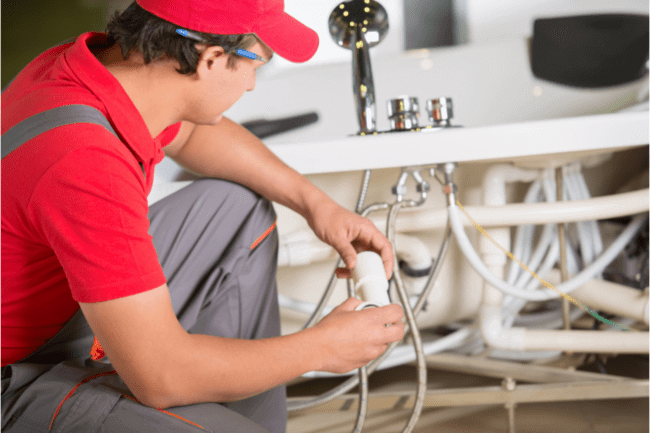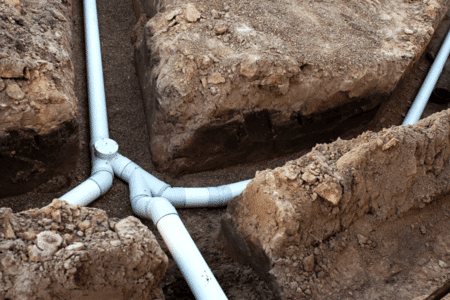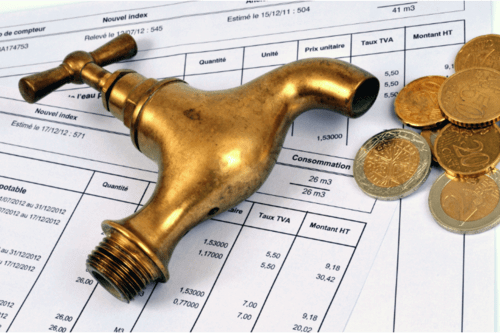How well does your residential or commercial plumbing system work? A plumbing system that isn’t working correctly or failing can lead to numerous problems, including leaks, blockages, and even water damage, which can be extremely expensive to repair. In this blog post, we will identify some of the most common plumbing problems that homeowners and property managers face and provide tips for preventing them.
Common Plumbing Issues
Homes and businesses can experience the same types of plumbing problems, and if they’re left uncorrected, they can lead to low water pressure, water damage, and the need for expensive repairs.

- Burst Pipes – Burst pipes occur when a pipe completely fails. They can cause significant water damage and require immediate attention.
- Clogged Drains – Clogged drains can be caused by a buildup of hair, food particles, soap, and paper products other than toilet paper.
- Dripping Faucets – A dripping faucet may seem like a minor issue, especially since it doesn’t typically cause water damage. However, a faucet that drips as little as once per minute can waste up to 3,000 gallons of water each year.
- Garbage Disposal Problems – Garbage disposals are designed to break up food particles so that they more easily flow through your plumbing pipes. However, it’s not recommended to put meat scraps, fats, coffee grounds, egg shells, or vegetable rinds down disposal. This can clog the disposal and jam the blades.
- Leaking Pipes – Since most pipes are hidden behind walls, it’s important to be vigilant. Leaking pipes can cause damage to the surrounding walls and flooring and increase your water bills.
- Low Water Pressure – Low water pressure can be caused by mineral buildup in the pipes or a leak in the main water line.
- Running Toilets – A toilet that continues to run after flushing is usually a sign of a malfunctioning flush valve. It’s important to have this problem repaired quickly. Leaking toilets can waste up to 200 gallons of water a day.
- Sewer Line Issues – Cracked and clogged sewer lines can lead to water backing up into your building and stinky water on your property.
- Sump Pump Failures – Sump pumps are used to funnel water out of basements. A malfunctioning sump pump can lead to flooding and water damage.
- Water Heater Problems – A water heater that does not produce hot water or enough hot water should be tended to immediately. Additionally, if the tank starts leaking, the unit will need to be replaced.
Preventative Maintenance Tips
In order to prevent the common plumbing issues mentioned above, it’s best to be proactive when dealing with your plumbing system.

- Keep Drains Clear – Use drain covers to catch hair and other debris and always practice good drain management.
- Pay Attention to Your Pipes – While most pipes are located behind walls, it’s important to check the pipes you can see, like the ones under your sink and toilet. Keep an eye out for any unusual puddles or water stains on walls.
- Properly Dispose of Grease and Oil – Never put great, oil or any type of fat down your drains. It can solidify in the pipes, leading to a clog.
- Pay Attention to Low Water Pressure – If you notice low water pressure, it’s best to hire a professional plumber to test the system.
- Flush Hot Water Heater – Water heaters should be flushed every year or two in order to remove the buildup of sediment. Sediment collecting in the bottom of the tank can lead to hotspots and excessive wear and tear,
- Avoid Using Drain Cleaning Chemicals – Drain cleaning chemicals may not fully clear the clog, and if the chemical is left in the pipe, it can create holes.
- Maintain Your Sump Pump – Test your sump pump regularly to make sure it’s functioning correctly and consider installing a backup system.
- Address Plumbing Issues Promptly – If you notice any signs of a plumbing problem, such as slow drains or leaks, call a qualified plumber to repair the problem.
Common Signs of Plumbing Problems
If you notice any of these plumbing problems, it’s time to call a professional plumber in Independence, OH.

- Suddenly High Water Bills With No Clear Reason
- One or More Slow Drains
- Gurgling Noises After Flushing the Toilet or Running Water Down the Sink
- A Lack of Hot Water or Not Enough Hot Water
- Sudden Growth of Mold or Mildew
- Puddles Around Sinks, Toilets, and Bathtubs and No One Has Run the Water Recently
- Stains and/or water Spots on Your Ceilings or Walls
The Benefits of Professional Plumbing Services
When your residential or commercial plumbing system is showing signs of wear and tear, damage, or problems, it’s time to call our father-daughter plumbing team in Independence, OH. Our more than 40 years of plumbing experience means that we have the experience and expertise to diagnose your plumbing problems and implement the correct repairs the first time. We also always adhere to the best safety practices and all the applicable building regulations and codes.
Conclusion
It’s imperative to maintain your commercial or residential plumbing system for the safety and health of all the occupants in your building. Preventative plumbing maintenance, including keeping drains clear, performing regular pipe inspections, and testing your water pressure, can help avoid costly repairs and keep your plumbing system functioning correctly. Additionally, working with a professional plumber for annual inspections and maintenance can help identify and address potential plumbing issues before they become expensive and time-consuming problems.
If you need a professional plumber in or around Independence, don’t hesitate to give us a call at 216-789-7544.
